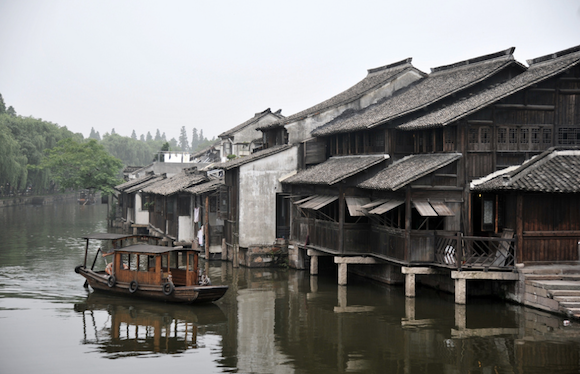At China’s first World Internet Conference in the Zhejiang canal town of Wuzhen — nicknamed “the Wuzhen Summit” — Chinese President Xi Jinping said in his welcoming remarks that China encouraged the creation of a “multifaceted, democratic and transparent governance system for the international internet” (多边、民主、透明的国际互联网治理体系”. [Homepage image created with “iPhone 6 Plus” by Luke Ma, available at Flickr.com under Creative Commons license.]
Xi Jinping was not, in fact, present at the conference. His written remarks were recited by vice-premier Ma Kai (马凯). But the president’s bold presence could be felt in China’s assertiveness at the summit, which leaders pledged to hold every year, fashioning it as the “Davos of the East” (东方达沃斯).

In much the same way that China has pursued a more assertive foreign policy under Xi, it is now staking its claim to the right to decide how the global territory of the internet should be governed.
This is about a more assertive foreign policy for cyberspace. And China’s vision is a carving knife.
The internet is global. That, at least, is the originating vision of the internet. But official China, which now recognises a global internet premised on free and fair access as an imminent threat, wants instead an international internet, a splinternet governed and limited by specific national interests. China’s interests, as defined by the ruling Chinese Communist Party, should be appropriately represented, seeing as the country now accounts for almost one-quarter of the world’s internet users.
When Xi Jinping talks about a more “democratic” governance system, what he means is that China wants its rightful say in this international order — a seat, if we may, on the hypothetical Internet Security Council.
Gone are the days when China’s so-called Great Firewall – its hardware for filtering internet traffic — was the physical manifestation of a chronic insularity. Back then, the world of ideas was bisected into the “internal,” or dui nei (对內), and the “external,” or dui wai (对外). The purpose of the Great Firewall was to hold back the tide of foreign influence.
This insular outlook was reflected in the institutionalisation of controls. The dui nei concerns, how to control the Chinese public by “guiding public opinion” (to call it simply “censorship” belittles the ambitions of Chinese authorities), were the province of the Central Propaganda Department.
But from the early days of internet control, when the web was an indistinct force and the lightning was on the horizon, the management of the internet was placed under the Information Office of the State Council, the government agency dealing expressly with foreign, or dui wai matters — the same office that publishes the English-language China Daily, the newspaper meant for foreign readers of China.
The internet was a foreign thing. And like all foreign things, it was something to emulate and fear.
The internet is no longer lightning on the horizon. A new generation of social media promise global information sharing in multiple formats in real time. A report in the New York Times about the family fortune of a senior Chinese Communist Party official is no longer a dui wai matter — it can (and will) be shared almost instantly on Chinese social networks. Internet control is not just the new heart of censorship and propaganda, it is a life-and-death matter for the Party.
The walls have come down. The time for half-measures is over. The only choice China’s ruling Party now has is to march forth and make its insularity global.

David Bandurski
CMP Director





















